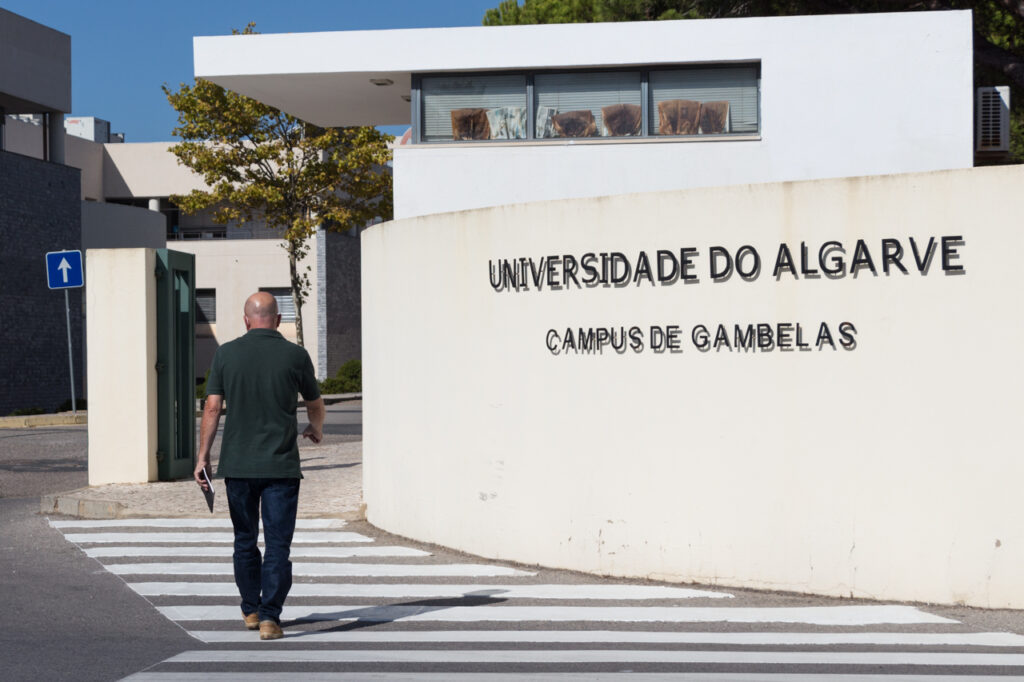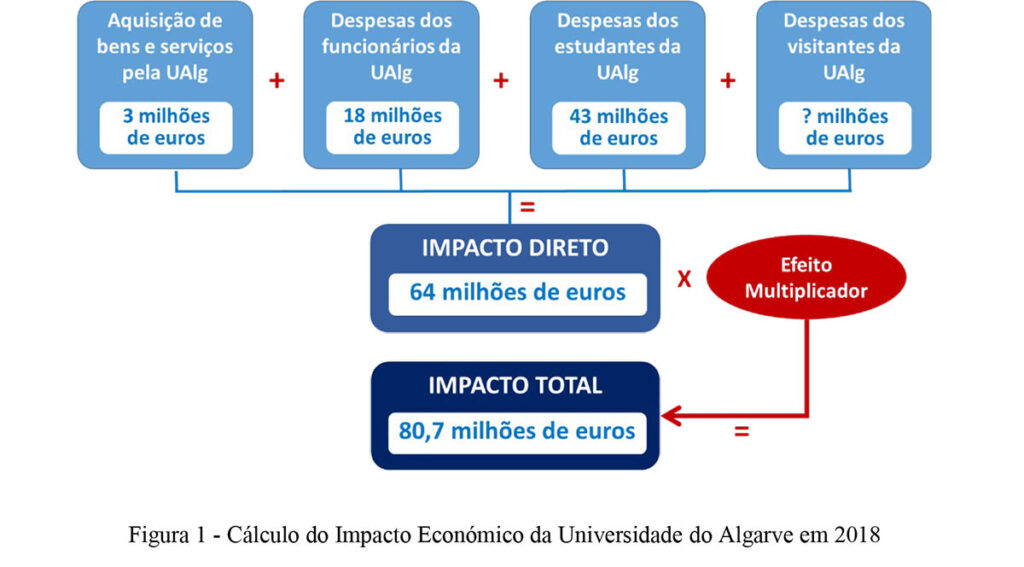The University of Algarve, created in 1979, emerged as a response to the need to address development problems in the country, and in particular in the Algarve region, not only in terms of training specialized staff, but also in terms of taking advantage of social and economic externalities. generated by its operation.
,
With a current academic community of approximately 9.900 people, more than 170 courses and a 2019 budget of over 62 million euros, the University of the Algarve undoubtedly represents one of the most dynamic forces in the region, both economically and in social terms.
On the one hand, it is the largest educational institution in the region, with 8650 students enrolled in the 2020/21 academic year. On the other hand, its 1242 employees, on 31/12/2019, make it one of the largest employers in the region.
The impacts that the University projects on the region are diverse. Among the most relevant direct impacts, we have, without a doubt, the jobs created and the stimulus that the Institution, through its students and employees, provokes in the regional economic activity, as a result of its consumption activities.
In this regard, it should be noted that the existence of the University of the Algarve is a means by which tens of millions of euros, mostly from outside the Algarve, are introduced annually into the regional economy, either through acquisitions made by the University itself, or those carried out by its staff and students.
A study carried out recently by the authors of this article, and which adopted, for the purposes of quantifying the impact of the University, the so-called 'economic-based approach', which seeks to determine what would happen in terms of wealth and employment if the University did not exist, allowed to conclude that, of the 9,72 million euros spent by the University of Algarve in the acquisition of current goods and services and in the acquisition of capital goods in the year 2018, 31%, in other words, about 3 million euros , were purchases made from suppliers residing in the Algarve.
It is undisputed, however, that the main economic impact of the University in the region occurs through the consumption made by its employees and students, which was estimated to have been, in 2018, in the order of 18 and 43 million euros, respectively.
It follows that, in calendar year 2018, the direct economic impact of the University of Algarve on the regional economy, namely resulting from the application of the University's budget allocations and the expenditure of its academic community in the economic development of the region, will have exceeded 64 million of euros.
Among the economic sectors that most benefit from the existence of the University of the Algarve, the wholesale and retail trade sector, the real estate and rental activities sector, and the accommodation and catering sector stand out, in descending order. .
It should be noted, however, that the impact of the University of the Algarve is not reduced to the direct employment created and the expenses incurred, as we must also not forget that this Institution indirectly supports a very considerable number of jobs and that the effect of consumption carried out by the University, by its staff and students, is expanded as a result of the multiplier effect.
This effect reflects the additional economic activity generated by economic agents who seek to respond to requests for goods and services by the University and its academic community.
Based on the production multipliers associated with each of the activity sectors of the regional economy, it was estimated that the indirect impact of the University of the Algarve and its academic community will have exceeded 16 million euros in 2018, making a total economic impact in the order of 80 million euros, as can be seen in Figure 1.
It is important to note, however, that these figures most likely represent a conservative estimate of the real economic impact of the University of the Algarve in the region, given that the lack of credible estimates regarding the expenses of the University's visitors and its academic community caused that this component was not included in the analysis performed.
Based on the results of previous studies carried out by the authors, regarding the impact of the University and what has been its evolution in terms of the number of students and staff, it is estimated that the total aggregate economic impact of the University of Algarve in the region, over its 41 years of existence, it will have exceeded 2 billion euros, a value corresponding to around 1% of national GDP in 2019.
In terms of employment, our estimates indicate that more than 2290 jobs may be dependent on the University.
The creation of jobs and the financial impact of the University do not represent, however, the fundamental effects of this institution at a regional level.
More important than this impact is the fact that the University of Algarve contributes to the increase of human capital through the higher education it provides, providing the Region and the Country with qualified human resources in the most diverse fields.
Proof of this are the more than 40 graduates from the University of Algarve during its 41 years of existence. If we add to this the fact that a very considerable percentage of graduates remain in the region to carry out their activity, we can conclude that this institution has been making an essential contribution to meeting the needs of qualified staff in the region.
Even in relation to investment in human capital, the impact of the University goes far beyond the simple training of staff, as, although hardly measurable, the long-term personal, family and social benefits resulting from this training are vital for well-being. and social and cultural progress of its population.
We must not forget that the University works as a catalyst for economic activities, either by the research it carries out, generating jobs and promoting increases in productivity, or by the availability of qualified labor that characterizes it, or by triggering processes of business dynamics, or even facilitating the emergence of new business opportunities.
On the other hand, the strong concentration of students in the cities where it is located, the congresses it holds and the cultural events to which it is associated, have given rise to remarkable urban revitalization and urban animation processes.
In fact, the University of the Algarve currently represents a very significant source of cultural and social enrichment for the region.
In addition to these effects, it should also be noted that a considerable fraction of the funds that the University receives from the State Budget ends up returning to the public coffers in the form of taxes.
For all these reasons, it is indisputable that the University of the Algarve has, in its 41 years of existence, contributed very significantly to local, regional and national economic growth and development.
Note: The methodology that served as the basis for calculating the estimates presented in this article and the results achieved are discussed in detail in the book “The Economic Impact of the University of Algarve in the Algarve Region”, by João Albino Silva, Rui Nunes and Sérgio Santos , published in 2020, by the Universidade do Algarve Editora (ISBN: 978-989-8859-91-4).
Authors: João Albino Silva, Rui Nunes and Sérgio Santos, Faculty of Economics, University of Algarve
Note 2: article published under the protocol between the Sul Informação and the Algarve Delegation of the Order of Economists





















Comments